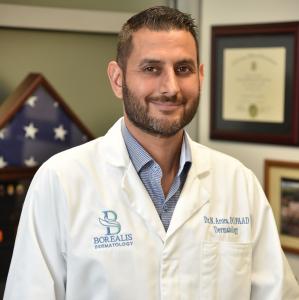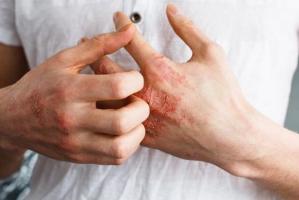October is National Eczema Awareness Month
Long Island Dermatologist Highlights New Eczema Treatments and Approaches to Reduce Flare-ups During the Change of Seasons
Eczema can interfere with sleep, work, relationships, and overall well-being.”
GARDEN CITY , NY, UNITED STATES, October 10, 2025 /EINPresswire.com/ -- Eczema affects more than 31 million people in the United States, and with October designated as National Eczema Awareness Month, it is a critical time to spotlight advances in care and daily practices that help patients manage this often-debilitating condition.— Dr. Navin Arora
Dr. Navin Arora, board-certified dermatologist and founder of Borealis Dermatology with locations in Garden City, Syosset, and Bellerose, NY, is committed to raising awareness of eczema, one of the most common chronic skin conditions. He emphasizes that while the condition does not have a definitive cure, new treatments and better skincare practices are making it easier to manage symptoms and prevent flare-ups.
Eczema, or atopic dermatitis, is a chronic skin condition that causes dryness, itchiness, inflammation, and rash-like symptoms. It’s not contagious, but it can significantly affect comfort and quality of life. There are seven types of eczema, including contact dermatitis, nummular eczema, dyshidrotic eczema, and seborrheic dermatitis. It affects people of all skin tones, often presenting as red and inflamed skin on lighter skin and brown, purple, gray, or ashen patches on darker complexions.
“This condition affects the skin and people’s lives,” said Dr. Arora. “Eczema can interfere with sleep, work, relationships, and overall well-being.”
One of the most notable advancements in eczema care is the recent FDA approval of Anzuppo, a new non-steroidal topical cream specifically for hand eczema. “This is a significant development,” Dr. Arora shared. “Hand eczema is particularly difficult to treat due to the thicker skin on the hands and frequent hand use, which can wear off treatments quickly. Anzuppo offers a steroid-free option for patients who need long-term treatment without the side effects of topical steroids.”
Dr. Arora advises patients to focus on daily management routines to reduce flares and maintain healthy skin. His top skincare recommendations include: taking shorter, cooler showers (5–10 minutes with lukewarm water); moisturizing immediately after bathing using thick creams or ointments that are fragrance-free and contain ceramides; avoiding products with added fragrance or alcohol; wearing soft, breathable clothing like cotton; avoiding sitting on rough surfaces like grass or synthetic materials with bare skin; using low-pH cleansers designed for sensitive or eczema-prone skin; and identifying and avoiding personal triggers such as harsh soaps, extreme temperatures, or allergens.
Dr. Arora stresses the importance of getting an accurate diagnosis. “Itchy skin is not always eczema, it could also be caused by kidney disease, lymphoma, shingles, urticaria, or other conditions. That is why evaluation by a dermatologist is crucial before starting any treatment.”
Patients with eczema have several prescription and non-prescription options available, including topical steroids, immunosuppressants, and newer non-steroidal agents like Anzuppo. For less severe symptoms, cold compresses or wraps may offer relief. Natural remedies such as colloidal oatmeal baths or baking soda soaks also help ease itching and irritation.
Over-the-counter treatments and home remedies can be helpful for mild cases; patients should always consult a dermatologist before starting a new regimen, especially when symptoms worsen or do not respond to basic care.
Adults with atopic dermatitis are at higher risk for diabetes, obesity, autoimmune diseases, high blood pressure, and heart disease, risks that increase with severity. Children with the condition may also face elevated risks for metabolic syndrome and autoimmune disorders.
Contact Borealis Dermatology to schedule an appointment with Dr. Arora and his team if an evaluation is needed or seasonal skin flares emerge. Borealis Dermatology offers three convenient locations in Garden City, NY, Syosset, NY and Bellerose, NY to provide various treatments for patients in the Queens and Long Island areas. Contact Dr. Navin Arora at (516) 246-8800 or visit https://borealisderm.com.
William J Corbett
Corbett Public Relations
+1 516-775-0435
email us here
Visit us on social media:
Instagram
Facebook
YouTube
X
Legal Disclaimer:
EIN Presswire provides this news content "as is" without warranty of any kind. We do not accept any responsibility or liability for the accuracy, content, images, videos, licenses, completeness, legality, or reliability of the information contained in this article. If you have any complaints or copyright issues related to this article, kindly contact the author above.



